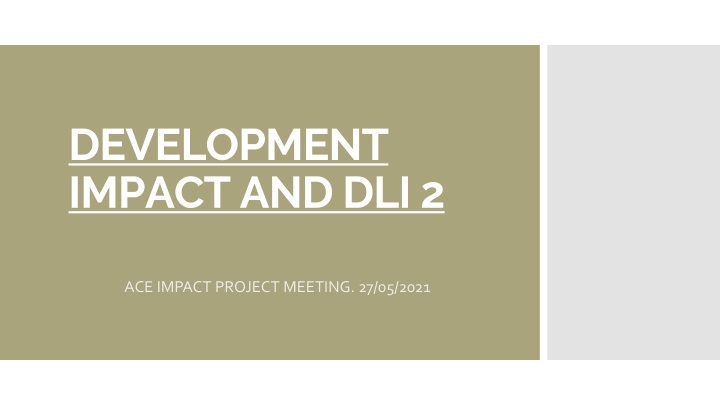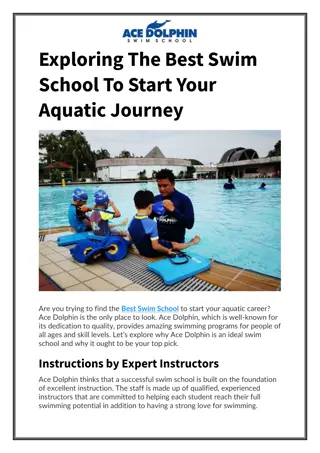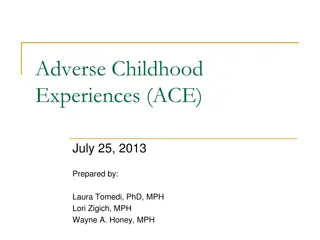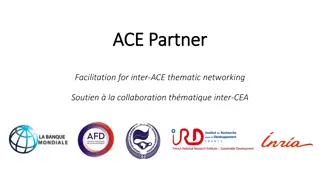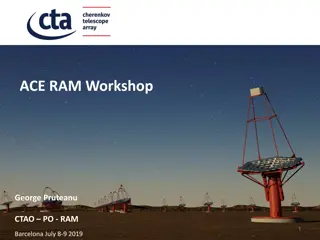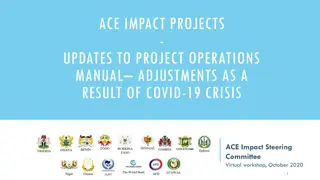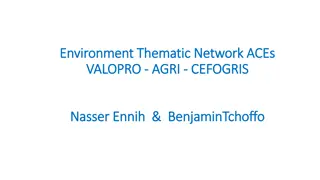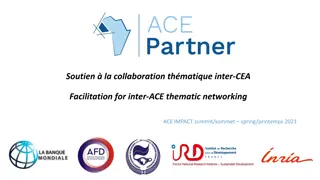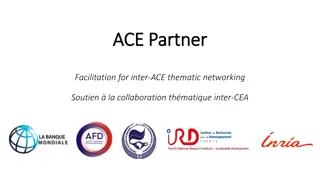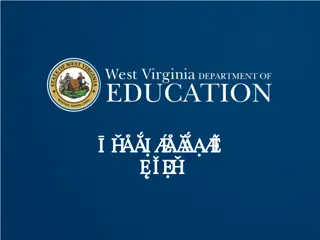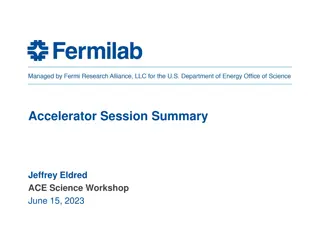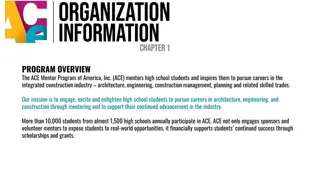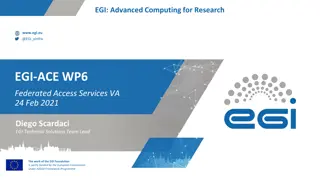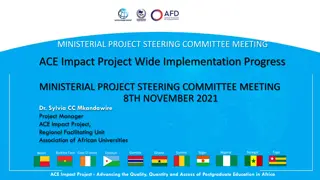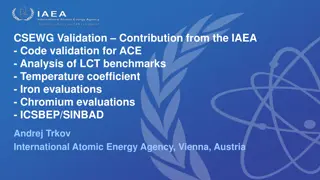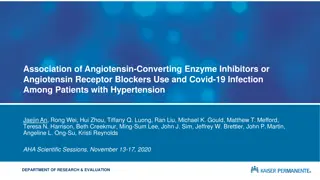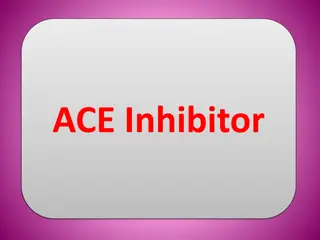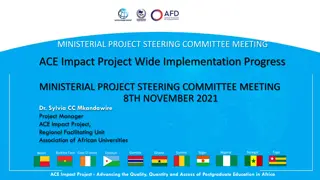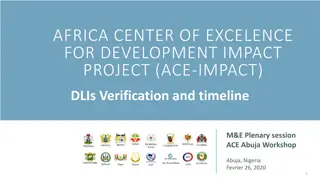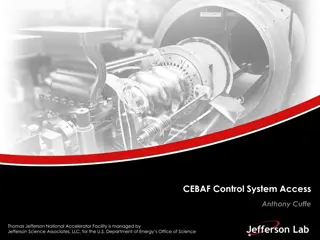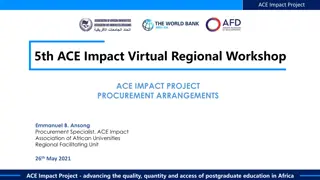ACE Impact Project Meeting Analysis
This content discusses the ACE Impact project meeting held on 27/05/2021, focusing on evaluating development impact, DLI 2 criteria, expectations, and strategies to enhance postgraduate education, research, and technology uptake. It emphasizes the importance of measuring development impact, external evaluation, and achieving DLIs for funding.
Download Presentation

Please find below an Image/Link to download the presentation.
The content on the website is provided AS IS for your information and personal use only. It may not be sold, licensed, or shared on other websites without obtaining consent from the author.If you encounter any issues during the download, it is possible that the publisher has removed the file from their server.
You are allowed to download the files provided on this website for personal or commercial use, subject to the condition that they are used lawfully. All files are the property of their respective owners.
The content on the website is provided AS IS for your information and personal use only. It may not be sold, licensed, or shared on other websites without obtaining consent from the author.
E N D
Presentation Transcript
DEVELOPMENT IMPACT AND DLI 2 ACE IMPACT PROJECT MEETING. 27/05/2021
ACE IMPACT AND DLI 2. DEVELOPMENT IMPACT WORKING GROUP AND DLI 2 EVALUATION Agenda EVALUATION CRITERIA COMMENTS AND EXPECTATIONS
ACE IMPACT AND DLI 2. DEVELOPMENT IMPACT
Improve the quality, quantity and development impact of postgraduate education Reduce the higher-level skills gaps ACE Impact Improve applied research and technology uptake Strengthen higher education training and applied research programs
Measure the development impact of each Center through independent, external evaluation DLI 2. Development Impact both at national and regional level, in terms of the extent of their contribution to their sector/industries Assess the quality of the postgraduate graduates and applied research DLI 2 varies between countries from US$25,000 to US$35,000 equivalent per point in the score (1 to 5 scale)
ACE Impact is a results-based initiative, under which Centers must achieve DLIs to earn funds DLI 2 entails an evaluation of each Center by an External Evaluator Evaluating DLI2 Evaluation in year 2 or 3 (for renewal and new Centers, respectively) and then in year 4 To ensure quality and transparency in the evaluation, a Working Group was created to guide on the criteria and methodology for evaluating DLI 2
Evaluation shall include: Number of student internships Relevance and impact of graduates on society, including the number of graduates hired in the sector Number of short courses delivered in response to sectoral stakeholder requests Impact of research / innovation (startups / prototypes) Progress on other DLIs / DLRs Evaluation of Center and SAB annual reports Interviews with graduates, sectoral stakeholders, employers, Evaluating DLI2
WORKING GROUP AND DLI 2 EVALUATION
Diverse constitution: 3 Center Leaders, 2 Reps from AAU, 2 Reps from WB, 2 Experts Responsibilities: draft the TOR for the external evaluation of DLI 2, define methodology, disseminate outputs to assure transparency, support evaluation process, help with recommendations Working Group Three web meetings: between 1stof March and 15thof April Deliverables: TOR for independent evaluation of DLI 2 with proposed methodology, meeting reports, present in regional workshop, webminar
Evaluate the contribution of the Centers towards development impact, in terms of graduates and applied research Make an overall independent assessment (by an external consultant) of the performance of the project, with attention to the impacts of the project activities against its objectives Broad objectives of the evaluation Analyse the spillover effects and outcomes of the development impact Identify key lessons and propose practical recommendations for follow-up actions
Diversity of methods/tools: participatory and self assessment methods, qualitative and quantitative, desk reviews, surveys, interviews, Methodology of the evaluation (external consultant) Engage with the Working Group, the AAU, and all relevant supportive service/data providers Produce a detailed workplan, an inception report, a detailed scoring process (share with the Centers), and a final report with the evaluation and recommendations / lessons learned Start in May and end in October 2021 Done remotely (including virtual interviews)
Evaluation is expected to account for the variation among Centers (one size does not fit all) criteria may vary with the sector/Center Methodology of the evaluation (external consultant) Open surveys/interviews: allowing for Centers, and their stakeholders, to fully express their opinions Criteria divided in human capital and research Criteria are proposed as a guidance, and should be later selected, or increased, according to the sector/Center
EVALUATION CRITERIA
Number of ACE student internships in the sector Number of ACE graduates placed in sector related jobs (for renewals only) Impact of Center graduates in society and in the sector Impact of Center studies on graduates Quality and relevance of ACE skills that ACE graduates are bringing to internships/jobs Examples of excellence Dissemination and outreach Relationship with ACE alumni Evaluation criteria as proposed by the Working Group: human capital
Number of short courses delivered in response to sector requests Impact of Center research on regional development of the sector Technology transfer (e.g.: startups and prototypes) KPIs referring to C&D activities Outreach and collaboration with society Number of research grants Dissemination of information within sector Intellectual property Presence of the Center as a regional hub for ideas and excellence Evaluation criteria as proposed by the Working Group: research
COMMENTS & EXPECTATIONS
Evaluation of DLI 2 is complex and difficult WG process was participatory and transparent Evaluation needs to be flexible & open Comments / expectations External consultant is key for the success of the evaluation (independent, experienced, rigorous) Success means quality of the evaluation & recommendations Full collaboration of the Centers, and all stakeholders, is determinant
